高二英语选修7-unit5教案
- 格式:doc
- 大小:50.00 KB
- 文档页数:10
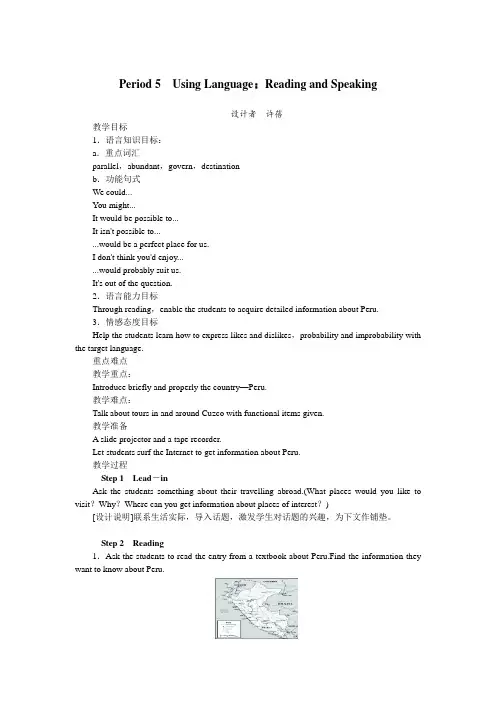
Period 5Using Language:Reading and Speaking设计者许蓓教学目标1.语言知识目标:a.重点词汇parallel,abundant,govern,destinationb.功能句式We could...You might...It would be possible to...It isn't possible to......would be a perfect place for us.I don't think you'd enjoy......would probably suit us.It's out of the question.2.语言能力目标Through reading,enable the students to acquire detailed information about Peru.3.情感态度目标Help the students learn how to express likes and dislikes,probability and improbability with the target language.重点难点教学重点:Introduce briefly and properly the country—Peru.教学难点:Talk about tours in and around Cuzco with functional items given.教学准备A slide projector and a tape recorder.Let students surf the Internet to get information about Peru.教学过程Lead-inAsk the students something about their travelling abroad.(What places would you like to visit?Why?Where can you get information about places of interest?)[设计说明]联系生活实际,导入话题,激发学生对话题的兴趣,为下文作铺垫。
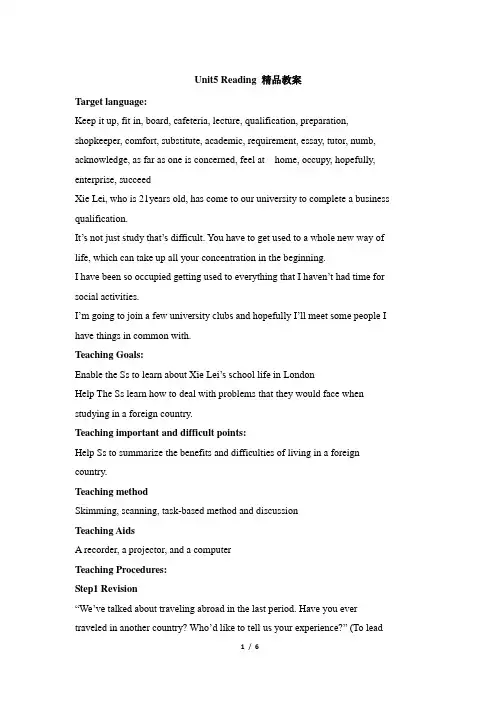
Unit5 Reading 精品教案Target language:Keep it up, fit in, board, cafeteria, lecture, qualification, preparation, shopkeeper, comfort, substitute, academic, requirement, essay, tutor, numb, acknowledge, as far as one is concerned, feel at home, occupy, hopefully, enterprise, succeedXie Lei, who is 21years old, has come to our university to complete a business qualification.It’s not just study that’s difficult. You have to get used to a whole new way of life, which can take up all your concentration in the beginning.I have been so occupied getting used to everything that I haven’t had time for social activities.I’m going to join a few university clubs and hopefully I’ll meet some people I have things in common with.Teaching Goals:Enable the Ss to learn ab out Xie Lei’s school life in LondonHelp The Ss learn how to deal with problems that they would face when studying in a foreign country.Teaching important and difficult points:Help Ss to summarize the benefits and difficulties of living in a foreign country.Teaching methodSkimming, scanning, task-based method and discussionTeaching AidsA recorder, a projector, and a computerTeaching Procedures:Step1 Revision“We’ve talked about traveling abroad in the last period. Have you ever traveled in another c ountry? Who’d like to tell us your experience?” (To leadin the difficulties when traveling abroad. If no one goes abroad before, just share points according to a familiar TV series telling the story of Chinese students in Canada.)Step2. Pre-readingTalk about studying in a foreign country. First present two pieces of news to start with.Show the news on the screen.(What can you learn from the two news items?) --- security problems while studying abroad.News 1On Dec 6tth 2005, two Chinese overseas students were killed in Ottawa, Canada. They were shot at a bar, one was shot dead at once, the other died during the way to the hospital. It was said the murder was Vietnamese. News 2Xinhua News Agency) A car accident happened to a group of Chinese overseas students in New Zealand on Sep 7th, 2005. New Zealand police said that the car accident happened in the early morning, one student, Xiao Ding, died on the spot, the other four students were hurt. Now two of them are still in hospital.As we know, now more and more people live or study abroad, even some senior or junior high school students are sent to study abroad. Do you know why?(Learn advanced tech; know more different cultures, enlarge knowledge and improve ability)Besides the security problems, what are other problems they might meet in their study and daily life? Now let learn a text about a Chinese girl studying in London. First, please turn to page37, look at the pictures and discuss the questions above them.Advantage & disadvantage respectivelyStep3 readingI.Skimming to find the main idea of each paragraph and answer thequestions in Comprehending 1.1.What is Xie Lei in England for? How long has she been in England?Xie Lei is an England for a degree course. She has been in England forsix month.2.Why is she doing a preparation course first?Xie lei’s preparation course can help her to get used to academicrequirements of a Western university.3.Why did Xie Lei feel like a child when she first arrived in England?Because she had to learn how to do everyday things like using atelephone, paying on a bus, finding her way around a strange city;understanding English as spoken in real life; learning how to writeessays acceptable to her British lecturer.4.Which two types of people have helped Xie Lei most since she came toEngland?Her host family and her teachers.5.Why has Xie Lei decided to join a few clubs?Because she thinks it’s important to have a balance between study anda social life, and she wants to make new friends.II.Read again. Look at some detailed information of the text, for difficulties / benefits. And then finish Comprehending 2Then let the Ss discuss the questions in Exercise 3.(group discussion is OK). Suggested answers:I think Xie Lei is a diligent and hard-working girl. She is brave to face difficulties and challenges both in life and stud.I think the reporter used some direct speech in the article in order that people who read this article can directly feel the difficulties and the benefits living in a foreign country.It is possible that this article might have been published in China daily. Because she had to learn almost everything again. She didn’t know how to deal with some simple things.Because she thinks it is important to make a balance between study and life. Step 4 DiscussionWe have talked about the difficulties and benefits of studying in a foreign country. Now let’s list the problems that Xie Lei had when she first went to England, and try to add two or three other problems that she might have andsummarize what you would do if you had the same problems. Work in groups. Possible problems and solution:Step 5 Homework1. Finish exercises in LEARNING ABOUT LANGUAGE2. Suppose you are Xie Lei, write a letter to your parents or friends in China, telling them about your present life according to what you have learned form the text.。
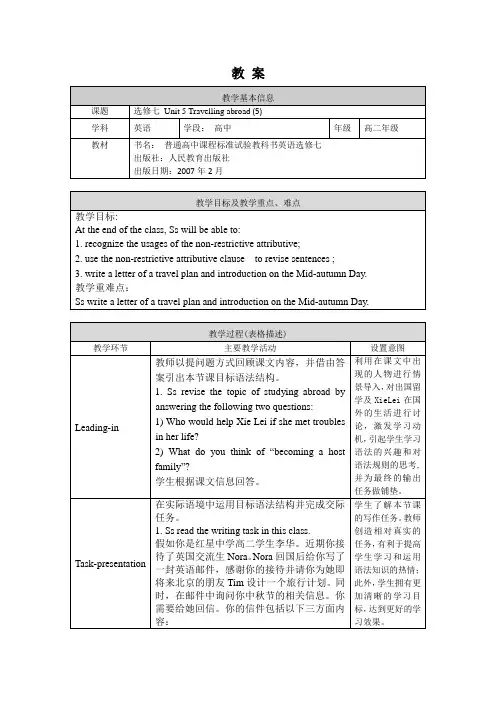
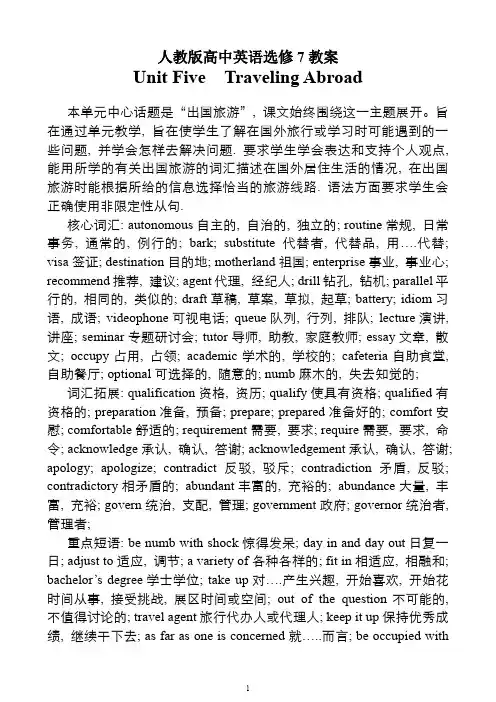
人教版高中英语选修7教案Unit Five Traveling Abroad本单元中心话题是“出国旅游”, 课文始终围绕这一主题展开。
旨在通过单元教学, 旨在使学生了解在国外旅行或学习时可能遇到的一些问题, 并学会怎样去解决问题. 要求学生学会表达和支持个人观点, 能用所学的有关出国旅游的词汇描述在国外居住生活的情况, 在出国旅游时能根据所给的信息选择恰当的旅游线路. 语法方面要求学生会正确使用非限定性从句.核心词汇: autonomous自主的, 自治的, 独立的; routine常规, 日常事务, 通常的, 例行的; bark; substitute代替者, 代替品, 用….代替; visa签证; destination目的地; motherland祖国; enterprise事业, 事业心; recommend推荐, 建议; agent代理, 经纪人; drill钻孔, 钻机; parallel平行的, 相同的, 类似的; draft草稿, 草案, 草拟, 起草; battery; idiom习语, 成语; videophone可视电话; queue队列, 行列, 排队; lecture演讲, 讲座; seminar专题研讨会; tutor导师, 助教, 家庭教师; essay文章, 散文; occupy占用, 占领; academic学术的, 学校的; cafeteria自助食堂, 自助餐厅; optional可选择的, 随意的; numb麻木的, 失去知觉的;词汇拓展: qualification资格, 资历; qualify使具有资格; qualified有资格的; preparation准备, 预备; prepare; prepared准备好的; comfort安慰; comfortable舒适的; requirement需要, 要求; require需要, 要求, 命令; acknowledge承认, 确认, 答谢; acknowledgement承认, 确认, 答谢; apology; apologize; contradict反驳, 驳斥; contradiction矛盾, 反驳; contradictory相矛盾的; abundant丰富的, 充裕的; abundance大量, 丰富, 充裕; govern统治, 支配, 管理; government政府; governor统治者, 管理者;重点短语: be numb with shock惊得发呆; day in and day out日复一日; adjust to适应, 调节; a variety of各种各样的; fit in相适应, 相融和; bachelor’s degree学士学位; take up对….产生兴趣, 开始喜欢, 开始花时间从事, 接受挑战, 展区时间或空间; out of the question不可能的, 不值得讨论的; travel agent旅行代办人或代理人; keep it up保持优秀成绩, 继续干下去; as far as one is concerned就…..而言; be occupied with忙着做…., 忙于某事; settle in安顿下来;重点句型:“It’s not just study that’s difficult. You have to get used to a whole new way of life, which can take up all your concentration in the beginning,”explained Xie Lei, who had live all her life in the same city in China.I have been so occupied with work that I haven’t had time for social activities.主要语法: 定语从句(非限定性从句)Period One Warming up and Reading Task Teaching goals:Talk about traveling or living in another country.Enable the students to discuss what they would learn when traveling or living in another country.Discuss the problems and dangers that could happen while traveling in a foreign country and the solution.Teaching important points:Train students’ speaking abilityTrain students’ reading abilityTeaching difficult points:How to deal with the problems that are likely to happen when traveling and how to prevent themStep 1 Warming upShow the beautiful scenery of other countries to attract students’attention, including Taj Mahal, the Pyramids of Egypt, London Bridge, Sydney Opera House, Eiffel Tower, Statue of Liberty, Stonehenge, New Zealand, South America, etc.Questions:1) Are you eager to travel abroad to enjoy the beautiful scenery by yourself?2) If you could go anywhere in the world, which country would you like to visit and why?3) What kind of things would you learn by being a tourist in a country and what would you learn best by working or studying there?(Suggested answers: architecture; places of interest; the economic situation; manners and customs; the proprieties of the country; slang; the differences in time, food, transportation; destinations; route;) Step 2 Reading taskSo, in strange surroundings, any unexpected things may happen. Now, turn to Page 82, try to list the dangers and problems, then discuss ways you could prevent theses things happening in groups.1. What problems did each traveler have? Did you guess correct? What2. Work with a partner. Complete the advice to travelers.1) When changing plans, __________________________________.2) If you have to take special medicine while traveling overseas, _______.3) If traveling alone, ____________________________________.4) When traveling, always wear ____________________________.Step 3 Homework1) Learn the new words and expressions by heart.2) Let students talk about their experiences of traveling.Period two Reading语言知识目标:1)学生能正确运用以下单词: lecture; recommend; preparation; comfort; academic; requirement; acknowledge; occupy; contradict; substitute;2)掌握下列词组的意思并能在句子中熟练运用: keep it up; fit in; get / be used to; as far as one is concerned; be occupied with;语言技能目标:学会表达和支持个人观点, 能用traveling abroad的词汇描述在国外居住生活或者学习的情况.情感态度和文化意识目标:1)帮助学生树立国际意识, 培养学生跨文化交际能力.2)培养学生坚强的意志, 坚定克服困难迎接挑战的能力.3)在小组合作互动中, 增强学生的团队合作与分享意识.重难点: 使学生了解在国外旅行和学习时可能会遇到的一些问题, 并学会怎样去解决问题和避免这些问题的发生.Step 1 Pre-readingRecent years, more and more Chinese students have chosen to study abroad. It has become a tendency. Do you think it is a good thing or not? Would you like to study in a foreign country? Why or why not?Step 2 Fast-reading1) What is Xie Lei in England for? How long has she been in England?________________________________________________________.2) Why is she doing a preparation course first?________________________________________________________.3) What are some of the difficulties she was faced with when she first came to England_____________________________________________.4) Which two types of people have helped Xie Lei most since she came to England?_____________________________________________________.Step 3 Detailed reading1. Summarize the main idea of each paragraphPara1: __________________________________________________.Para2: __________________________________________________.Para3: __________________________________________________.Para4: _________________________________________________.Para5: __________________________________________________.Para6: ___________________________________________________.Para7:___________________________________________________2. 根据课文内容填空.3. Find out the details about benefits she got and difficulties she met in4. 根据课文内容选出可以填入空白处的最佳答案.1) Xie Lei choose to board with an English family so that she _______.A. can learn the new lifestyle and customB. can save a lot of moneyC. will not feel lonely in a foreign languageD. can live a comfortable life2) Xie Lei thinks the preparation year is beneficial because ______.A. studying in a foreign country is not quite different from studying in China.B. it is difficult to adjust to the new way of life.C. she is like a child who needs to be looked after.D. she can spend less time in studying.3) According to the text, we can know that _______.A. idioms are not so difficult to understandB. foreign students need one year to prepare for their majorsC. foreign tutors admire the autonomous learnerD. it is impossible that you read it from China Daily5. Discussion: We have talked about the difficulties and benefits of studying in a foreign country. Now let’s list the problems that Xoe Lei hadStep 4 Further reading1. adjust (sth / oneself) to sth.: 使适合新环境, 适应Could I adjust to Chinese life at 72?The body quickly adjusts itself to changes in temperature.身体迅速自行调节以适应气温的变化.2. habit: 指个人的习惯, 通常用于表示做事, 思考问题或行为, 兴趣举止的不自觉的方式或方法. practice: 即可以表示个人的也可以表示社会的习惯, 这种习惯是一种反复不断或者是有选择性的行为和方式. custom: 指风俗习惯, 按照某地区人们共同生活极其行为准则和规范, 它不仅有指导意义, 而且有必须遵循的意义.I’ve got the habit of turning on TV as soon as I get home.On the other hand, your stomach would turn at the idea of frying potatoes in animal fat—the normally accepted practice in many other countries.在另一方面, 一想到动物油煎马铃薯, 你便会作呕---然而在许多其他的国家里, 这是被大家所接受的习惯.Don’t be slave to the custom. 不要作风所习惯的奴隶.From the moment of birth, the _____ into which he is born shape his experience and behavior.A. habitsB. practicesC. conceptsD. customs3. take it easy: 别着急, make it: 成功;Well done, and keep it up, Tom!As long as you keep it up, you will succeed.只要你坚持, 你就会成功的.4. fit in: 相适应, 相融合; fit in with:与…..相适应, 与….相融合; be fit for: 胜任; be fit to do sth: 适合做某事; keep fit: 保持健康;Do our plans fit it in with your arrangement?我们的计划和你的安排相符合吗?We should learn to fit in with the changing situation.我们应该学会适应不断变化的形势.与keep相关的短语: keep one’s head / temper:保持冷静, 强压怒火; keep a school / family / diary:开办学校/ 养家糊口/ 写日记; keep one’s word / keep one’s promise:履行诺言; keep the law:守法; keep an eye on:照看, 密切注视; keep in touch with:与…..保持联系; keep up:保持不落后, 维持, 继续; keep up with:跟上, 保持同步; keep away:远离, 不接触; keep to sth:信守, 坚持, 不违背诺言; keep….from doing sth:避开, 禁止, 克制;The police asked the people to keep away from the scene of the accident. Though things changed, but she kept up.尽管情况有变, 她依然我行我素.He kept his conclusion to himself. 他对他的结论守口如瓶.You can depend on him, for he always keeps his words (说话算数的). (keep)5. It / This is / was the + 序数词+ time + that从句: 固定句型, “这是某人第几次干….”, 从句中的时态要用完成时.This is the first time I have been here.It was the third time that our teacher had talked with me.It is (about / high) time + that 从句: “某人早该干…..”, 从句中谓语动词要用虚拟语气.It’s (about / high) time we started.It’s time for sb. to do sth. 是该某人做某事的时候了.It’s time for us to get down to marking the papers.It was the first time in her life that she had seen the sea (她看到大海)。
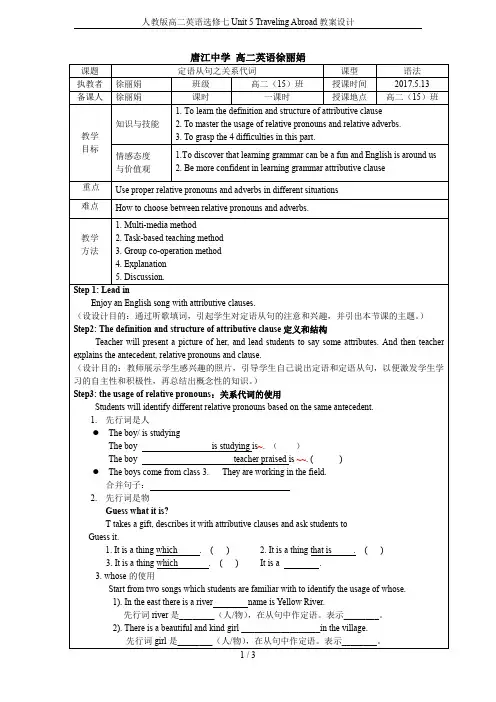
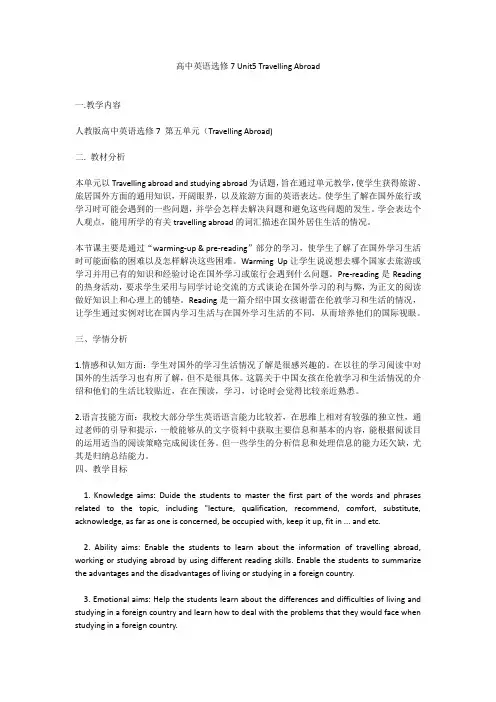
高中英语选修7 Unit5 Travelling Abroad一.教学内容人教版高中英语选修7 第五单元(Travelling Abroad)二. 教材分析本单元以Travelling abroad and studying abroad为话题,旨在通过单元教学,使学生获得旅游、旅居国外方面的通用知识,开阔眼界,以及旅游方面的英语表达。
使学生了解在国外旅行或学习时可能会遇到的一些问题,并学会怎样去解决问题和避免这些问题的发生。
学会表达个人观点,能用所学的有关travelling abroad的词汇描述在国外居住生活的情况。
本节课主要是通过“warming-up & pre-reading”部分的学习,使学生了解了在国外学习生活时可能面临的困难以及怎样解决这些困难。
Warming Up让学生说说想去哪个国家去旅游或学习并用已有的知识和经验讨论在国外学习或旅行会遇到什么问题。
Pre-reading是Reading 的热身活动,要求学生采用与同学讨论交流的方式谈论在国外学习的利与弊,为正文的阅读做好知识上和心理上的铺垫。
Reading是一篇介绍中国女孩谢蕾在伦敦学习和生活的情况,让学生通过实例对比在国内学习生活与在国外学习生活的不同,从而培养他们的国际视眼。
三、学情分析1.情感和认知方面:学生对国外的学习生活情况了解是很感兴趣的。
在以往的学习阅读中对国外的生活学习也有所了解,但不是很具体。
这篇关于中国女孩在伦敦学习和生活情况的介绍和他们的生活比较贴近,在在预读,学习,讨论时会觉得比较亲近熟悉。
2.语言技能方面:我校大部分学生英语语言能力比较若,在思维上相对有较强的独立性,通过老师的引导和提示,一般能够从的文字资料中获取主要信息和基本的内容,能根据阅读目的运用适当的阅读策略完成阅读任务。
但一些学生的分析信息和处理信息的能力还欠缺,尤其是归纳总结能力。
四、教学目标1. Knowledge aims: Duide the students to master the first part of the words and phrases related to the topic, including "lecture, qualification, recommend, comfort, substitute, acknowledge, as far as one is concerned, be occupied with, keep it up, fit in ... and etc.2. Ability aims: Enable the students to learn about the information of travelling abroad, working or studying abroad by using different reading skills. Enable the students to summarize the advantages and the disadvantages of living or studying in a foreign country.3. Emotional aims: Help the students learn about the differences and difficulties of living and studying in a foreign country and learn how to deal with the problems that they would face when studying in a foreign country.五、教学重点及难点1. Widen the vocabulary range. Develop the students’reading skills namely skimming and scanning and so on.2. Guide the students to summarize the benefits and difficulties of living in a foreign country.六. 教学方法1.演示法:通过相关的图片、PPT等网络多媒体辅助显示给学生看,便于学生对基础知识和背景知识的把握,并从旧知识中获得启迪,从而达到解决问题的目的。
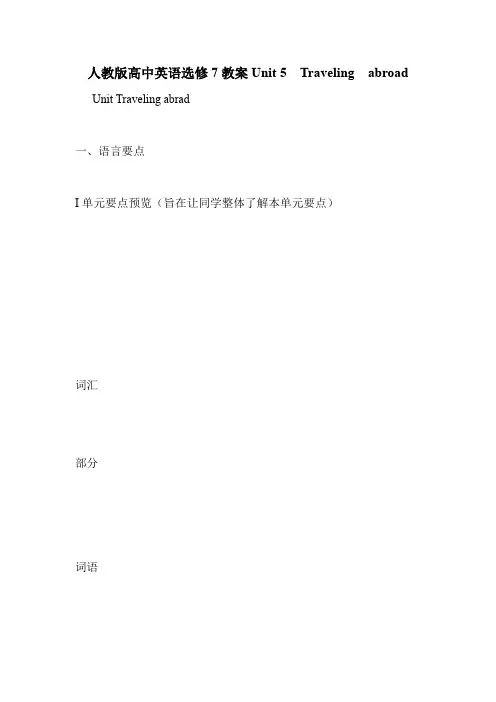
人教版高中英语选修7教案Unit 5 Traveling abroad Unit Traveling abrad一、语言要点I单元要点预览(旨在让同学整体了解本单元要点)词汇部分词语辨析1bard/abard/abrad/brad 2get used t/be used t/used t 词形变化1qualifiatin n 资格, 条qualif v (使)具有资格,2 preparatin n 准备, 预备prepare v 准备, 预备,3 frtable ad 舒适的frt n 安慰v 安慰, 使(痛苦等)缓和4 require v需要, 要求, 命令requireent n 需求, 要求, 必要条gvern v 统治, 支配管理gvernent n 政府,重点单词1 qualifiatin n资格;证明2 preparatin n准备;预备3 reend vt推荐;建议4 frt n舒适;安慰vt安慰substitute n代替者;代用品vt用……代替……6 anledge vt 承认;确认;答谢7 up vt占有;占领;占据8 gvern vi≈vt统治;支配;管理9 ntradit vt 反驳;反对;否认; 与矛盾10 abundant ad丰富的, 充裕的,重点词组eep it up 保持优秀成绩;继续干下去as far as ne is nerned 就……而言settle in(迁入新居;更换工作后)安顿下ut f the questin不可能的重点句型1 “It’s nt ust stud that’s diffiult u have t get used t a hle ne a f life, hih an tae up all ur nentratin in the beginning,” exp lained Xie Lei, h had lived all her life in the sae it in hina2 I have been s upied ith r that I haven’t had tie fr sial ativities重点语法被动语态(II)(见语法专题)II 词语辨析(旨在提供完形填空所需材料)1) bard/abard/abrad/brad【解释】bard n(木, 纸)板;滑水板vt用板铺;用板盖; 上(船、车、飞机)船舷; 甲板;abard adv ≈prep 在船(飞机、车)上, 上船(飞机、车)abrad adv往国外, 海外, 找教案http://zhaiaanbrad ad宽的, 阔的, 广泛的adv宽阔地【练习】选择bard/abard/abrad或brad并用其适当的形式填空1) Seties hen derating, e need t sa a ______ in half2) She said gd-be t her friends and _______ a plane fr Ne r3) She ent _______ the plane4) During the Spring Festival, an peple hse t travel _______) Liu xiang is faus fr his speed in hurdle at he and _______6) The gnasti ah has _______ shulders7) The rbber h rbbed the ban f ash ________ dalight as sentened t death at lastes: 1) bard 2) barded 3) abard 4) abrad ) abrad 6) brad 7) brad2) get used t/be used t/used t【解释】get used t +sth/ding sth 习惯于……(侧重于动作)be used t+sth/ding sht 习惯于……(侧重于状态)be used t d 被用做……(被动语态)used t过去常常(强调现在不再存在)【练习】选择get used t/be used t或used t,并用其适当的形式填空1) e ________ send ards t eah ther b pst N e send eletrni ards in stead2) I’sure that he ill sn __________ untr life3) N peple in it _________ shpping n the internet4) st f the d there ________ae furniturees: 1) used t 2) get used t 3) are used t 4) is used t III 词性变化(旨在提供语法填空所需材料)1qualifiatin n 资格, 条qualif v (使)具有资格,2 preparatin n 准备, 预备prepare v 准备, 预备,3 frtable ad 舒适的frt n 安慰v 安慰, 使(痛苦等)缓和4 require v需要, 要求, 命令requireent n 需求, 要求, 必要条gvern v 统治, 支配管理gvernent n 政府,【练习】根据句子结构,用括号内所提供词的适当形式填空1) ---Are u sure he is ________ t drive a ar?---es He gt his driving _______ befre he ______ as a teaher(qualifiatin)2) Ever fail is bus ______ fr the Spring Festival fr there are lts f _______ t d (preparatin)3) Anne h launhes a ar is ______ and is _______ b peple h lve peae all arund the rld (ae)4) The _______ f energ ill help us researh the a t save and _______ the energ (nserve)) Thugh the sup is _______, I’ve lst sense f ______ and it ____ust lie ______ater(taste)es:1) qualified; qualifiatin; qualified 2) preparing; preparatin 3) aese; aed 4) nservatin; nserve ) tast; taste; tastes; tastelessIV 重点词汇(旨在提供综合运用所需材料)1 qualifiatin n资格;证明[重点用法]qualif v (使)具有资格,证明合格qualifiatin as当任(职务等)的资格找教案http://zhaiaanqualifiatin fr在(某方面)具有资格取得资格,合格qualif as取得……资格qualif fr有……资格,有……权;应得;使合格,使能担任,使适合于qualif sb.t d sth.使某人有资格做某事[典例]1) hat’s the qualifiatin as a dtr?取得当一名医生的资格是什么?2) hat qualifiatins have u gt t have fr this b? 申请这个工作你得要具有的条是什么?3) D u qualif fr the vte? 你有投票资格吗?4) I hpe t qualif as a teaher 我希望取得教师资格。
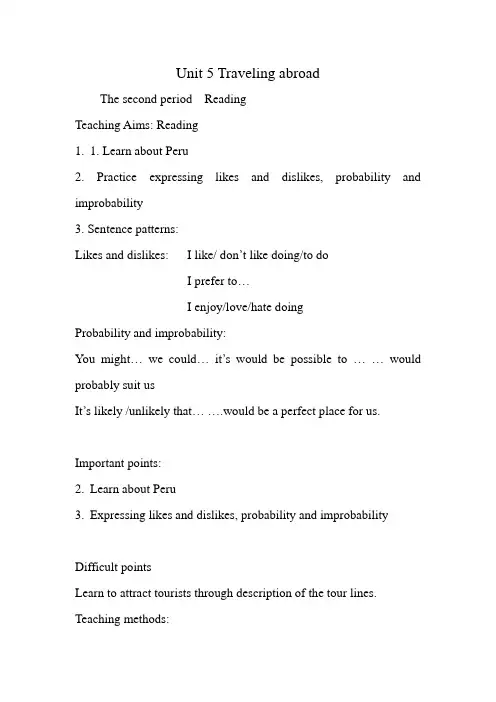
Unit 5 Traveling abroadThe second period ReadingTeaching Aims: Reading1.1. Learn about Peru2. Practice expressing likes and dislikes, probability and improbability3. Sentence patterns:Likes and dislikes: I like/ don’t like doing/to doI prefer to…I enjoy/love/hate doingProbability and improbability:You might…we could…it’s would be possible to ……would probably suit usIt’s likely /unlikely that…….would be a perfect place for us.Important points:2.Learn about Peru3.Expressing likes and dislikes, probability and improbabilityDifficult pointsLearn to attract tourists through description of the tour lines. Teaching methods:Ask and answer questions activitiesIndividual, pair and group workTeaching aidsA computer and a projectorTTeaching Procedures & waysStep 1: lead inAsk the students something about their traveling to Mysterious Island. Talk about traveling abroad.Step 2: Reading1. Ask the students to read the entry from a textbook about Peru. Find the information they want to know about Peru. Geographical areas:Capital city Lima:Ancient Inca capital Cuzco:The famous Inca ruins Machu Picchu:Andes Mountains:2. Questions:a. Why is Cuzco popular with tourists?b. What is special about Lake Titicaca?c. What do you think the official languages of Peru are?Step 3: Reading (pair work)1). Ask the students to read the brochure below and answer the following questions:1.Among the four tours, which one would best suit people wholike an active hol iday and don’t need first class accommodation?2.What kind of people would enjoy Tour 2?3.On which tours do you visit Machu Picchu (马丘比丘)?4.If you spent two weeks in an around Cuzco, which tour would bebest to do last?Step 4. Speaking (group work)1. Ask the student to choose 1 tour line, trying to describe it with attractive words and tones using expressions of likes and dislikes, probabilities and improbabilities.2. Ask the students to sell it.Step 5: Discussion1. Imagine your group plans to spend eight days in and around Cuzco, discuss which tour you will take. (using expressions of likes and dislikes, probabilities and improbabilities.2. Ask the other students to vote the line they choose to travel, and give their reasonsStep 6: Homework:Feed back:教学设计自然且环环相扣,课堂气氛轻松活泼。
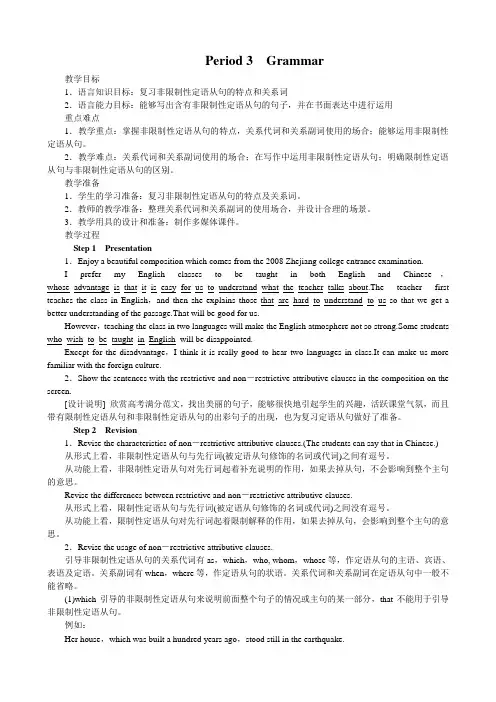
Period 3Grammar教学目标1.语言知识目标:复习非限制性定语从句的特点和关系词2.语言能力目标:能够写出含有非限制性定语从句的句子,并在书面表达中进行运用重点难点1.教学重点:掌握非限制性定语从句的特点,关系代词和关系副词使用的场合;能够运用非限制性定语从句。
2.教学难点:关系代词和关系副词使用的场合;在写作中运用非限制性定语从句;明确限制性定语从句与非限制性定语从句的区别。
教学准备1.学生的学习准备:复习非限制性定语从句的特点及关系词。
2.教师的教学准备:整理关系代词和关系副词的使用场合,并设计合理的场景。
3.教学用具的设计和准备:制作多媒体课件。
教学过程Step 1Presentation1.Enjoy a beautiful composition which comes from the 2008 Zhejiang college entrance examination.I prefer my English classes to be taught in both English and Chinese,whose_advantage_is_that_it_is_easy_for_us_to_understand_what_the_teacher_talks_about.The teacher first teaches the class in English,and then she explains those that_are_hard_to_understand_to_us so that we get a better understanding of the passage.That will be good for us.However,teaching the class in two languages will make the English atmosphere not so strong.Some students who_wish_to_be_taught_in_English_will be disappointed.Except for the disadvantage,I think it is really good to hear two languages in class.It can make us more familiar with the foreign culture.2.Show the sentences with the restrictive and non-restrictive attributive clauses in the composition on the screen.[设计说明] 欣赏高考满分范文,找出美丽的句子,能够很快地引起学生的兴趣,活跃课堂气氛,而且带有限制性定语从句和非限制性定语从句的出彩句子的出现,也为复习定语从句做好了准备。
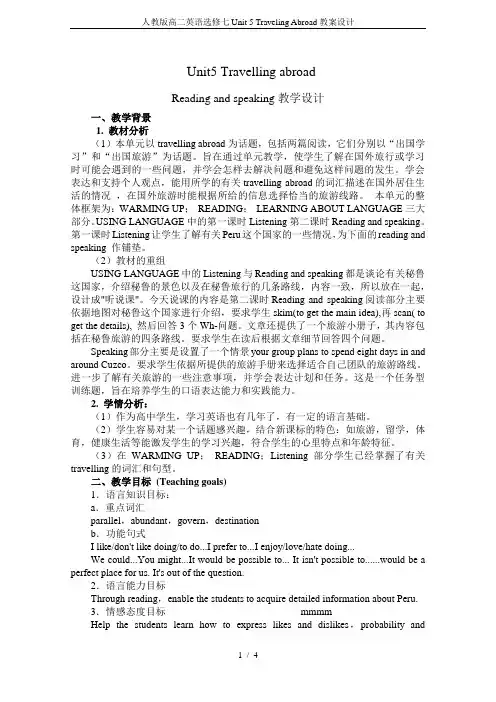
Unit5 Travelling abroadReading and speaking教学设计一、教学背景1. 教材分析(1)本单元以travelling abroad为话题,包括两篇阅读,它们分别以“出国学习”和“出国旅游”为话题。
旨在通过单元教学,使学生了解在国外旅行或学习时可能会遇到的一些问题,并学会怎样去解决问题和避免这样问题的发生。
学会表达和支持个人观点,能用所学的有关travelling abroad的词汇描述在国外居住生活的情况,在国外旅游时能根据所给的信息选择恰当的旅游线路。
本单元的整体框架为:WARMING UP;READING;LEARNING ABOUT LANGUAGE三大部分。
USING LANGUAGE中的第一课时Listening第二课时Reading and speaking。
第一课时Listening让学生了解有关Peru这个国家的一些情况,为下面的reading and speaking 作铺垫。
(2)教材的重组USING LANGUAGE中的Listening与Reading and speaking都是谈论有关秘鲁这国家,介绍秘鲁的景色以及在秘鲁旅行的几条路线,内容一致,所以放在一起,设计成"听说课"。
今天说课的内容是第二课时Reading and speaking阅读部分主要依据地图对秘鲁这个国家进行介绍,要求学生skim(to get the main idea),再scan( to get the details), 然后回答3个Wh-问题。
文章还提供了一个旅游小册子,其内容包括在秘鲁旅游的四条路线。
要求学生在读后根据文章细节回答四个问题。
Speaking部分主要是设置了一个情景your group plans to spend eight days in and around Cuzco。
要求学生依据所提供的旅游手册来选择适合自己团队的旅游路线。
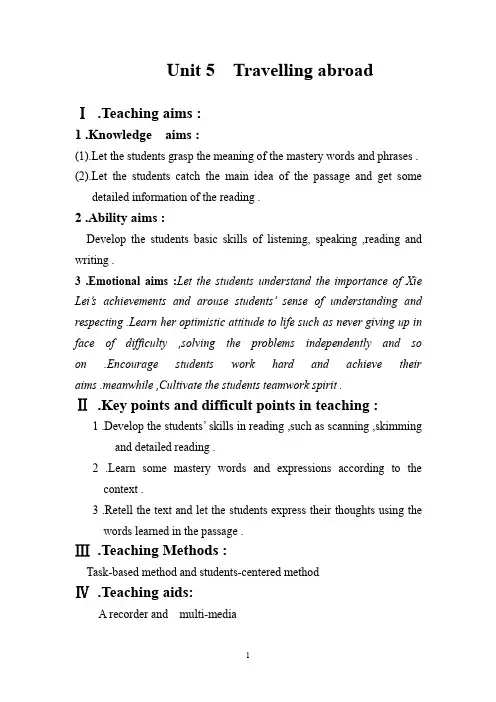
Unit5Travelling abroadⅠ.Teaching aims:1.Knowledge aims:(1).Let the students grasp the meaning of the mastery words and phrases.(2).Let the students catch the main idea of the passage and get somedetailed information of the reading.2.Ability aims:Develop the students basic skills of listening,speaking,reading and writing.3.Emotional aims:Let the students understand the importance of Xie Lei’s achievements and arouse students’sense of understanding and respecting.Learn her optimistic attitude to life such as never giving up in face of difficulty,solving the problems independently and so on.Encourage students work hard and achieve their aims.meanwhile,Cultivate the students teamwork spirit.Ⅱ.Key points and difficult points in teaching:1.Develop the students’skills in reading,such as scanning,skimmingand detailed reading.2.Learn some mastery words and expressions according to thecontext.3.Retell the text and let the students express their thoughts using thewords learned in the passage.Ⅲ.Teaching Methods:Task-based method and students-centered methodⅣ.Teaching aids:A recorder and multi-mediaⅤ.Teaching procedures:Step1.Preparation:Divide the students into four groups and get them to finish one task. Let the students find out words and expressions related to traveling and studying abroad.Step2.Revision and leading-inThe world is getting smaller and smaller.We have more and more opportunities to travel or study abroad.Travelling helps us learn a lot about local customs and broaden our views.Besides,it is relaxing and we can get rid of our anxiety and stress.Step3.Pre-reading:Discussion:What are the advantages and disadvantages of studying in a foreign country?Advantages:1.Learn standard English.municate with the local people3.Know the manners and customs of the country better.4.Help us to be independent.Disadvantages:1.Be difficult for us to communicate with the foreignpeople and we should adapt to the situation quickly.2.Cost a lot of money.3.Miss our homes,miss our parents and friends. Step4Reading:1.Scanning:match the main idea to each paragraph Para.1Para.2Para.3Para.4Para.5Para.6Para.7A.The general introduction to Xie Lei and her studyB.The advantages of living with a host family.C.Xie Lei,a Chinese girl,is studying in a foreign country--London.D.Xie Lei is getting used to the Western University’s way of learning.E..The newspaper will follow Xie Lei’s progress in later editions.F.The difficulties Xie Lei met while living in London.G.Xie Lei feels much more at home in England now and is living an active life.2.Skimming:Task1:Fill in the blanks.Of doing a preparation course1.to help her to__________western____________;2.to get used to________________.of living with a host familyBenefits 1.to learn more about________and_________.2.to have people to explain things____________.of having a tutor1.to explain about why she cannot______what otherpeople had said without_______________it.2.to___________her to express her own ideas.at the university1.to learn to read______and________the texts. Difficulties2.to__________her own opinion with_______.of a new way of life1.to find a____between study and a________.2.to make new______.Task2.Discussion.Xie lei’s problems Your solutions1.understanding andusing everydayEnglish2.reaching theacademicrequirements of aWestern university 3.making new friends 1.listening to the radio or watching television to become accustomed to everyday English 2.asking her tutor for advice before starting her academic writing3.joining a lot of university clubs3.Detailed readingTask1:Summarize the main idea of the whole text.It mainly talks about the Chinese student Xie Lei’s___________, especially about some_______she gets as well as some_______she faces while studying in London.Task2:DiscussionWhat kind of person do you think Xie Lei is?Find evidence in the article to support your opinion.4.Post-reading:Interview:Suppose you are a newspaper reporter.Please interview Xie Lei.Step5Homework:1.Underline all the important and difficult phrases and sentences inthe text.2.Suppose you are Xie Lei,Write a letter to Your parents to tell them about your learning abroad.The designs on the blackboard:Step1.PreparationStep2.Revision and leading-inStep3.Pre-readingStep4Reading教学反思:。
Unit 5 Traveling abroadThe First Period SpeakingTeaching goals1. Target languagea. 重点词汇和短语adjust to,advantage,find out ,youth hostels,communityb. 交际用语expressing and supporting an opinionYou might …It’s a possibility...P robably…It’s (very) possible that...It could happen.Most probably...It’s not very likely… I doubt it.He/She/They will probably...2. Ability goalsEnable the students to discuss what they would learn when traveling or living in another country. And how to deal with the problems and dangers that could happen while traveling in a foreign country.3. Learning ability goalsHelp the students learn how to deal with the problem that they could meet while traveling..Teaching important pointsLet students learn to use the structures of expressing and solve the problems.Teaching difficult pointsHow to deal with the problems that are likely to happen when traveling and how to prevent them.Teaching methods1. Looking at the questions. (individuals).2. Pairs work to discuss and work in groups of four.(task-based , cooperative learning).Teaching aids1. A computer2. A projectorTeaching procedures & waysStep I Greeting and RevisionT: Good morning/afternoon, boys and girls! First, let’s check the homework.1.Check whether they have remembered the ten importantsentences.2.Check whether they have previewed the new words andexpressions in this unit.Step II Warming up*Talk about the problems with the teacher’s help.T: If you had chance to go abroad in the world, which country would you like to visit and why ? and what kind of things would you meet or learn best? Look at the problems on Page 37. You can discuss the following questions with your partner.Qs: 1.If you could go anywhere in the world, which country would you like to visit and why?2. What kind of things would you learn best by being a tourist ina country and what would you learn best by working orstudying there?3. How differences or easy do you think it is to adjust to living ortraveling in another country? What kind of differences might you experience?4. Have you talked to anyone who has spent some time inanother country? What did they find unusual or difficult about it?DiscussionSa: If I had chance to travel abroad, I’d like to visit New Zealand. It’s said that it’s a beautiful country, I’d like to enjoy the beautifulscenery in New Zealand.Sb: If I had chance, I’d like to go to America. Maybe it is better if I could work or study there, then I could learn English well.Sc: I ‘d like to go to Egypt, because I want to know about the ancient culture.T: What kind of things would you learn best by being a tourist in a country and what would you learn best by working or studying there?Sa: When we travel to another country, maybe we could know about the architecture of the country, the beautiful scenery, the economic situation and so on.Sb: When we work or study in the country, maybe we could know more about the manners and customs of the country. We could learn the standard English better, we could communicate with the local people to improve our English.Sc: If we could live with the local people, we could know the proprieties of the country, know more slang, know the difference in time, food, transportation etc. between the two countries.T: Very good. You can think so many things. Have you talked to anyone who has spent some time in another country? What did they find unusual or difficult about it?Ss: Well, I have talked to my friend who had been to a foreigncountry, he told me something different or interesting in the foreign country. For example, in India, most people don’t eat meat, especial beef, they like to eat vegetables and fruits, so if you invite an Indian for dinner, never order steak for them.Step III SpeakingT: Well, we talked about the things that we could learn while we traveling or studying in a foreign country. Then, what kind of problems or dangers would happen while traveling in a foreign country? Now, turn at page to P82, try to list the dangers and problems, then discuss ways you could prevent these things happening in groups. The following sentence patterns are helpful for you:You might… Most probably, …It’s a possibility…It’s likely/unlikely that…Probably, … It’s not very likely… I doubt it.It’s (very) possible… He/She/They will probably.It could happen.(After a few minutes)T: Well, are you ready ? Who’d like to show us your opinion?Sa: While traveling, it’s possible that you could lose you way, because you don’t know the country very well. To prevent this:◆You’d better take a map of the country with you.◆Don’t leave alone without saying a word.◆Pay attention to the conspicuous signs, for example, somefamous buildings, some special road signs so that you can ask the way while you are lost.Sb: It’s likely that we could meet malefactors--- robber, thief or others. Probably, we will be hurt. To prevent this:◆Don’t show your valuable belongings to others.◆You’d better go along with other people.◆Should you face dangers, connect the police.Sc: It’s (very) possible that we could have difficulty in communicating with the local people. To prevent this:◆Try to grasp the simple and basic communicated language◆Try to know about the manners and customs of the country◆Try to be familiar with formality in everyday lifeStep IV TalkingT: OK! So much for the questions. You did a very good job, I’m sure that you have known how to deal with the problems while traveling or studying in a foreign country. If we wanted travelalone with a little money, could you find a good way to save money?Sa: Maybe we could travel on foot or by second-class rail.Sb: We could stay at the small inn to save money, but maybe the situation there is not good.T: Well, there is a good and not expensive place for travellers--- Youth Hostels, Hostels provide clean safe place to stay and have community kitchens. Now, let’s r ead something about Youth Hostels and discuss the questions in groups.(5 minutes later.)T: OK. Let’s look at the questions. Are youth hostels expensive or cheap to stay in?Ss: They are cheap. They offer quality accommodation at low cost. T: Yes. And how many people share a bedroom in a hostel?Ss: There are 4,5, or 6 people.T: What is the advantage of staying in a place with a kitchen when you are traveling?Ss: If there were a kitchen in the hostel, I could cook by myself, it’s It is good economy to cook on my own.T: What is the advantage of having a Youthpass?Ss: Youthpass offers travelers cheap train fares in most European countries. It can make you maximize your time and minimize yourcost.T: How old must you be to get a Youthpass?Ss: For those under age 26 on their first day of travel.T: Why is it a good idea to buy travel insurance?Ss: Because while traveling, we may face unexpected illness or accident, no matter where you go to in the world, the cost of medical treatment can be very high, if you buy travel insurance, it can afford all medical treatment of you while traveling abroad.T: Then would you enjoy staying in a youth hostel? Why?Ss: Though there are many advantages of staying in a youth hostel, I still like to travel in collective tour. Tourists can help each other in case of an emergency.Ss: Well, I like youth hostel very much. Because I like traveling on my own, I like to enjoy the sense of freedom, I can do whatever I like. Also, it’s convenient for traveler to stay in youth hostel.T: Good. There is little time, let’s look at our homework.Step V Homework1.Learn the new words and expressions by heart2.Let students talk about their experiences of travelling FEEDBACK:学生评价较高,学生普遍反映现在有更多机会用英语交流,锻炼了能力也树立了信心。
人教版高中英语选修7《Unit 5 Trav elling abroad》教案2篇The teaching plan of unit 5 travelling abroad编订:JinTai College人教版高中英语选修7《Unit 5 Travelling abroad》教案2篇前言:英语作为在许多国际组织或者会议上都是必需语言,几乎所有学校选择英语作为其主要或唯一的外语必修课。
英语教学涉及多种专业理论知识,包括语言学、第二语言习得、词汇学、句法学、文体学、语料库理论、认知心理学等内容。
本教案根据英语课程标准的要求和教学对象的特点,将教学诸要素有序安排,确定合适的教学方案的设想和计划、并以启迪发展学生智力为根本目的。
便于学习和使用,本文档下载后内容可按需编辑修改及打印。
本文简要目录如下:【下载该文档后使用Word打开,按住键盘Ctrl键且鼠标单击目录内容即可跳转到对应篇章】1、篇章1:人教版高中英语选修7《Unit 5 Travelling abroad》教案2、篇章2:人教版高中英语选修7《Unit 5 Travelling abroad》教案篇章1:人教版高中英语选修7《Unit 5 Travelling abroad》教案教学准备教学目标1.Students are able to summarize the general ideas of each paragraph by reading the text.2.Students can summarize the benefits and the difficulties of life abroad by reading again3.Students can learn about the Xie Lei’s character by discussion.4.Students can master some difficult words, phrases and sentences by explanation.教学重难点1.Students are able to summarize the general ideas of each paragraph by reading the text.2.Students can summarize the benefits and the difficulties of life abroad by reading again 教学过程教学过程Step 1 Warming upShow the beautiful scenery of other countries to attract students' attention,including the pyramids of Egypt,London Bridge,Sydney Opera House,Eiffel Tower,,Stonehenge,etc.Questions:1.Do you like traveling?2.If you have chance to go abroad, where would you like to go for travel?设计意图:课堂以欣赏国外优美的风光, 在给学生以极大的视觉享受的同时,激起他们对于出国旅行,学习的向往,至于最想去的国家或地方更能让他们有话可说。
选修七Unit 5 Travelling AbroadPeriod 3 GrammarI. Teaching aims:1. Ask the ss to find 5sentences in which non-restrictive attributive clause is included2. To learn the non-restrictive attributive clause3. Enable the ss to consolidate the grammar.II. ProceduresStep1. Find 5 sentences in which non-restrictive attributive clauses are used from the text:1.Xie Lei, who is 21 years old, has come to our university to study for a business qualification.2. She is halfway through the preparation year, which most foreign students complete before applying for adegree course.3. You’ve to get used to a whole new way of life, which can take up all your concentration in the beginning.4. Living with host families, in which there may be other college students, gives her the chance to learn moreabout the new culture.5. He wanted to know what I thought, which confused me because I thought that the author of the articleknew far more than I did.Step2.非限定性定语从句定语从句分为限制性定语从句(restrictive)和非限制性定语从句(non- restrictive )The teacher told me that Tom was the only person that I could depend on. 老师告诉我说汤姆是我唯一的可以依靠的人。
Unit5 Travelling AbroadPeriod Two Reading教案I. Teaching aims:1.To raise the students’ interest in studying life in a foreign country.2. Develop the students’ speaking and reading ability3. Help the students to summarize the benefits and difficulties of living ina foreign countryII. Teaching procedure:Step1. pre-readingDo you want to go abroad for a further study?Give many famous universities’ pictures in the worldOxford University; Cambridge University; Princeton University; Harvard University;Yale University;Massachusetts Institute of Technology.Step 2. Discussion:What are the advantages and disadvantages of studying in a foreign country?Step 3: scanningscan the whole passage as quickly as you can to tell whether the following statements are true or not. For the false ones, point out the mistakes and give the correct sentences.1 It was the first time that Xie Lei had left her home country.2 She has come to the England University to complete a literature qualification.3 Most foreign students must complete the preparation course before entering a course.4 Xie lei lives in student apartments with her students.5 Now ,Xie lei doesn’t feel much more at home in EnglandKey:TFTFFStep4: Read again and number the main idea of each paragraph.3The difficulties Xie Lei met in London.7The newspaper will follow Xie Lei’s progress in later editions.2 Introduction to Xie Lei and her study.4 The advantages of living with a host family.6 Xie Lei feels much more at home in England now and is living an activelife.1 Xie Lei , a Chinese girl , is studying in a foreign country .5 Xie Lei is getting to the Western University’s way of learning.Step5. Choose the best answer.1)Who does Xie Lei board with in England?A. Her classmatesB. HerselfC. A host familyD. Her family2) Why does Xie Lei have such a decision that she wouldlike to board with while studying in England?A. She feels lonely while staying in a foreign country.B. She is afraid to get used to a new life in a new country.C. She can make good preparations for her courses.D. She can have opportunities to learn more about life and customs in a new country.3) How does Xie Lei try to get used to the new life in England?A. She tries to avoid rising a feeling of homesick.B. She tries to join in a few university clubs to share more socialactivities and meet some people she had much in common withC. She tries to put her heart into her preparation course.D. She tries to protect herself from the strange environment and doesnothing to make herself familiar with the culture.4) What can we learn from Xie Lei according to the passage?A. She is timid.B. She is brave.C. She is determined.D. She is honest.Step6. Read carefullyand answer the following questions:1. What is Xie Lei in England for? How long has she been in England?Xie Lei is in England for a degree course. She has been in England for six months.2. Why is she doing a preparation course first?Xie Lei’s preparation course can help her to get used to academic requirements of a Western university. So she first finished the course.3.Why did Xie Lei feel like a child when she first arrived in England? Because when she first arrived in England, she had to face the difficulties of daily life, for example, how to use the phone, how to pay on the bus. She had to face the difficulties of learning at the university, eg, she can’t understand the expressions others say.4. Which two types of people have helped Xie Lei most since she came to England?When she came to England, she lived with a host family, so the members of the family always helped her. The other type of people, I think, is her tutor and classmates, especially her tutor.5. Why has Xie Lei decided to join a few clubs?Because she thought it was important to have a balance between study and social life, so she decided to join a few clubs.Step7. Read the text again and fill in the diagram below:Benefits:1. Her preparation course is to help her to get used to academic requirements of a Western university.2.She thinks living with a host family can give students the opportunity to learn more about everyday life and customs in their new country.3. She thinks having a tutor is to encourage you to express your own ideas with reasons.Difficulties:1.at the university-------Studying here is quite different from studying in China and she needs some preparation first, either here or in China .2.Of a new life -------She has to get used to a whole new way of life, which can take up all her concentration in the beginning.Step8. Discussion:1.What kind of person do you think Xie Lei is? Discuss with your partners and find evidence in the article to support your opinion. Excellent;diligent; brave; strong-minded; firm determined; progressing; hard-working …I think Xie Lei is an excellent diligent girl, she can face difficulties bravely and she has firm determination, she studies well and has already made progress.Evidence:1 “ It’s not just study that’s difficult. You have to get used to a whole newway of life.”2“ When I miss my family, it’s a great comfort to have a substitute family to be with.”3 “ I have been so occupied with work that I haven’t had time for social activities.”2.Why do you think the reporter used some direct speech in the article? The writer used direct speech to show that he got the information in the article from Xie Lei herself. It also makes the article more interesting and gives some insight into Xie Lei’s character.3.Where do you think this article might have been published?It may have been published in a student newspaper/magazine or in a small local newspaper.Step9. summaryXie Lei boarded a plane for London six months ago to complete a business qualification. She is now halfway through the preparation year. At the beginning, she had to learn almosteverything again. She lives with a host family, which gives her the opportunity to learn more about everyday life and customs in her new country. She wrote her first essay to her tutor, but she only got an E. Now she has got used to the life and she feels much more at home and is going to join a few university clubs in order to have a balance between study and a social life. We wish Xie lei all the best with her enterprises.Keep it up ! Xie lei.Step10. post-reading:When you are faced with some difficulties in a foreign country, what do you do to solve them?Step11. Homework:Two in a group to make a dialogue:Suppose one of you is a newspaper reporter. You want to interview Xie Lei about her lifein England.The following words or phrases may help you:Keep it up, get along, make progress, board,adjust to, It is the first time….get use d to,as far as one is concerned, feel at home,all the best, etc.品味人生1、不管鸟的翅膀多么完美,如果不凭借空气,鸟就永远飞不到高空。
Unit 5 Traveling abroadThe third period Listening and speakingTeaching grade: Senior TwoTeaching content: Module 7 Unit 5 Traveling abroadListening and speakingTeaching goal: Enable the students to learn how to introduce tours, inquire traveling information, and choose tours. Through listening, enable the students to acquire detailed information. Help students learn how to deal with the problems while traveling.Teaching important and difficult points : Talk about tours and express likes, dislikes and probability with functional items given. Teaching methods : Task-based teaching, cooperative learning. Teaching aids: A multi-media computerTeaching procedures:Step I Warming upShow some pictures of places of interest, and ask the students something about these places.Questions : Do you like traveling? If you have enough time and money, where do you want to go most? Why?Step II ListeningListening material : SB Page 41 Using Language listening1 Listen for the first time and answer: Where is Lia planning to visit?2 Listen to the tape again and choose the right answer according to the question.1 Lia doesn’t like ________A to be independentB travel aloneC being hurried from place to place2 Which is Not the thing that Lia says she likes doing ? __________A Visiting museumsB Going to historical sightsC Going skiingD Looking at wildlife3 When she wanted some company she could _________A travel aloneB join a to ur groupC ask for friends’ helpStep III SpeakingTask 1:Talk about tours and discuss whether the tour is suitable with the expressions given :I like / don’t like doing / to do---I enjoy / love / hate doing---I prefer to ---You might ---It isn’t possible to --- would be a perfect place for us.I don’t think you’d enjoy --- would probably suit us Task 2:( A project ) Inquiring at the Travel Agency1) The whole class is divided into several groups and each group consists of four students.2) Each group is a travel agency. Showing out the postcards finished by each group in advance, the students imitate something happening in travel agencies to practice their English. (Student A, Student B, Student C in each group act as travel clerks in one travel agency. Student D in each group acts as a traveler to inquire about tour information from another travel agency. )Task 3: Report the inquiring result.Ask student D in each group to report his or her result, and the other students give their marks to each student D in the evaluation form according to his or her presentation, and decide the best group.Step IV ListeningListening material : SB Page 81 Listening TaskListen to the conversation twice and complete the following formStep V Problem solvingGet students to act out one of the following situations in groups1 You are a stranger in New York, you want to spend 3 days in traveling around, you want to ask a native’s suggestions.2 While traveling in Beijing, you lose your way, but you want to go to Qinghua University.3 While climbing Baiyun Mountain in Guangzhou, you have your leg injured.Step VI HomeworkWrite about problems that travelers might experience while traveling and the ways of preventing and dealing with them. Hand in the detailed inquiring report tomorrow.。
Period 4Listening教学目标语言技能目标:教给学生在听力开始前进行预测,或激活头脑中相关的背景知识,能够帮助自己更好地完成听力训练的听力技巧。
语言能力目标:训练学生在听的过程中注意细节信息的能力。
情感态度和文化目标:学生了解了一些独自旅行的注意事项,这对于他们将来独自旅行很有益处,同时对在秘鲁旅行有所了解。
重点难点教学重点:进行由泛听到精听的听力训练。
教学难点:教学生掌握一些听力技巧,例如在听力训练前,激活背景知识;在听力训练时以抓住大意为主要目标,尤其在第一二遍时,不拘泥于个别没有听懂的单词。
教学过程Step 1DiscussionQ:Have you ever been to other countries?If you travel abroad alone,will you feel afraid?Do you know how to predict a possible dangerous situation and prevent it happening?What advice can you give for safe travelling?T:Four students a goup,discuss them with your partners.(Collect the students' advice about safe travelling.)[设计说明]在进行听力之前,先让学生讨论安全旅行并给出一些建议。
因为这是听力材料里即将要听到的内容。
这一方面可以使学生对于即将要听到的材料做好思想准备,另一方面也降低了听力材料的难度。
Step 2Listening task(Page 82)1.T:Now let's listen to a conversation between Sandra,whose daughter wants to travel,and Brian.Sandra voices her concerns as a parent and Brian does his best to reassure her about her daughter's ability to act sensibly.Listen to their talk and guess what you think Sandra's relationship to Brian is.Give reasons.Suggested answer:They are probably work colleagues who know each other reasonably well.Reasons:They greet each other with “Morning”,a common greeting at the beginning of a workday.They call each other by their first names.Brian knows the daughter's name and also something about what kind of person she is so he has met her more than once.Brian may be older than Sandra or have a higher status in the company or it may just be that Sandra often asks Brian for advice.Sandra listens to Brian's advice carefully and appears to value it.2.Listen to the talk again and answer the following questions.(1)What does Tina want to do?(2)Why is Sandra worried about this?(3)What does Brian think about Tina's plans?(4)What does Brian suggest Tina should do until she has more experience of travelling?Suggested answers:(1)She wants to travel around the world for a year.(2)Sandra thinks travelling is dangerous.(3)Brian thinks it is good that Tina wants to travel as she will learn a lot that will help her in later life.(4)Brian suggests Tina should travel with a companion,preferably with someone who is more experienced than her.3.Listen again,paying attention to what Brian says.Then list the things he says a traveller should do to keep pare Brian's rules with the ones the students get from their discussion.Brian's rules for safe travelling________________________________________________________________________________________________________________________________________________________________________________________________________________________________________________________________________________________________________________________________________________________________________________________________________________________________________________________________________________________________________________________________________________________________________________________________Suggested answers:*Research the places you are going to visit.*Pay attention to what is happening around you.*Ask the locals for advice and follow it.*Observe how the people around you behave towards you.*Learn how to tell who you can and can't trust.*At first travel with a more experienced companion.[设计说明]听完第一遍对话后,要求学生推测对话的两个人的关系,然后再注意细节问题的答案,还是体现了由大到小、由粗到细的原则,也符合人们的感知规律。
Unit 5 Travelling abroad I.单元教学目标III. 教材分析与教材重组1. 教材分析本单元以travelling abroad为话题,旨在通过单元教学,使学生了解在国外旅行或学习时可能会遇到的一些问题,并学会怎样去解决问题和避免这样问题的发生。
学会表达和支持个人观点,能用所学的有关travelling abroad的词汇描述在国外居住生活的情况,在国外旅游时能根据所给的信息选择恰当的旅游线路,能推测什么事情可能会发生,哪种情况不会发生,会正确使用非限制性定于从句。
1.1WARMING UP 提供了四个有关旅行的问题,让学生用已有的知识和经验讨论在国外居住或旅行会遇到什么问题,并且该如何来解决这些问题。
1.2 PRE-READING是READING的热身活动。
提供了两个问题,它要求采用与同学讨论交流的方式谈论在国外学习的利与弊,激发同学们的学习兴趣。
1.3 READING是一篇介绍中国女孩谢蕾在伦敦学习的情况。
使学生对比在国内学习与在国外学习的不同。
Try to understand some of the benefits and difficulties she has in London.1.4 COMPREHENDING练习1通过四个问题来检查学生对课文的细节的理解。
练习2以图表的形式来分析在国外学习的利与弊。
练习3设置了五个讨论题,通过这些话题的谈论,挖掘文章的深层含义,激活学生自身的认知能力和思想认识能力。
练习4是概括能力训练题,在理解的基础上,重点训练学生的概括能力。
1.5 LEARNING ABOUT LANGUAGE分词汇和语法两部分。
其中,Discovering useful words and expressions是训练学生在语境中掌握词汇的能力,帮助学生加强动词变化形式的意识。
Revising useful structures 是关于非限制性定于从句,旨在训练学生对定语从句的理解、掌握和运用,并通过语法练习加以巩固。
1.8 USING LANGUAGE中的第一部分Listening要求学生先根据秘鲁的地图谈论有关秘鲁这个国家的一些情况, 然后完成三个相应的任务型练习。
首先是要求学生在听第一遍时能完成听力练习1的任务,即:选择那些是Lia喜欢做的事;听第二遍是要求学生回答五个问题;练习3是填空题。
通过这些题,培养学生学会获取听力材料中的具体用词和细节要点,同时让学生了解有关Peru这个国家的一些情况,为下面的reading and speaking 作铺垫。
第二部分Reading and speaking 作为一个整体教学材料。
阅读部分主要依据地图对秘鲁这个国家进行介绍,要求学生skim(to get the main idea),再scan( to get the details), 然后回答3个Wh-问题。
然后为大家提供了一个旅游小册子,其内容包括在秘鲁旅游的四条路线。
要求学生在读后根据文章细节回答四个问题。
Speaking部分主要是设置了一个情景your group plans to spend eight days in and around Cuzco。
要求学生依据所提供的旅游手册来选择适合自己团队的旅游路线。
进一步了解有关旅游的一些注意事项,并学会表达计划和任务。
这是一个任务型训练题,旨在培养学生的口语表达能力和实践能力。
1.9 WRITING 要求学生给一位即将到中国来学习的美国笔友写一封信,在信中向他介绍中国的一些情况,在中国的学习、生活中可能会遇到的问题及解决问题的办法,告诉他怎样更好的学习中国的文化以及你将提供给他的帮助。
2. 教材重组2.1 从话题内容上分析,WARMING UP 与READING相一致;而从训练目的上分析与TALKING比较一致。
从教材份量来说,可将WARMING UP与Workbook中的TALKING, SPEAKING TASK整合在一起,设计成一节任务型“口语课”。
2.2 可将PRE-READING, READING与COMPREHENDING三个活动整合在一起上一节“阅读课”。
2.3 USING LANGUAGE中的Listening与Reading and speaking都是谈论有关秘鲁这个国家,介绍秘鲁的景色以及在秘鲁旅行的几条路线,内容一致,所以放在一起,设计成一节"听说课"。
2.4可将LEARNING ABOUT LANGUAGE 与Workbook中的LISINGSTRUCTURES语法练习题整合在一起上一节“语法课”。
2.5 可将Workbook 中的Listening与Reading Task 与Writing Task 整合起来,上一节“综合实践课”。
2.6将WRITING 与Learning Tip 与Workbook中Project整合成一节“写作课”。
3. 课型设计与课时分配(经教材分析,根据学情,本单元可以用六课时教完)1st period Speaking2nd period Reading3rd period Listening and Speaking4th period Grammar5th period Integrating skills6th period WritingⅣ. 分课时教案The First Period SpeakingTeaching goals 教学目标1. Target language目标语言:a. 重点词汇和短语adjust to,advantage,find out ,youth hostels,communityb. 交际用语expressing and supporting an opinionYou might …It’s a possibility...Probably…It’s (very) possible that...It could happen.Most probably...It’s not very likely… I doubt it.He/She/They will probably...2. Ability goals能力目标Enable the students to discuss what they would learn when traveling or living in another country. And how to deal with the problems and dangers that could happen while traveling in a foreign country.3. Learning ability goals 学能目标Help the students learn how to deal with the problem that they could meet while traveling..Teaching important points教学重点Let students learn to use the structures of expressing and solve the problems. Teaching difficult points 教学难点How to deal with the problems that are likely to happen when traveling and how to prevent them.Teaching methods教学方法1. Looking at the questions. (individuals).2. Pairs work to discuss and work in groups of four.(task-based , cooperative learning).Teaching aids教具准备1. A computer2. A projectorTeaching procedures & ways教学过程与方法Step I Greeting and RevisionT: Good morning/afternoon, boys and girls! First, let’s check the homework.1.Check whether they have remembered the ten important sentences.2.Check whether they have previewed the new words and expressions in this unit.Step II Warming up*Talk about the problems with the teacher’s help.T: If you had chance to go abroad in the world, which country would you like to visit and why ? and what kind of things would you meet or learn best? Look at the problems on Page 37. You can discuss the following questions with your partner. Qs: 1.If you could go anywhere in the world, which country would you like to visit and why?2. What kind of things would you learn best by being a tourist in a country andwhat would you learn best by working or studying there?3. How differences or easy do you think it is to adjust to living or traveling inanother country? What kind of differences might you experience?4. Have you talked to anyone who has spent some time in another country? Whatdid they find unusual or difficult about it?DiscussionSa: If I had chance to travel abroad, I’d like to visit New Zealand. It’s said that it’s a beauti ful country, I’d like to enjoy the beautiful scenery in New Zealand.Sb: If I had chance, I’d like to go to America. Maybe it is better if I could work or study there, then I could learn English well.Sc: I ‘d like to go to Egypt, because I want to kno w about the ancient culture.T: What kind of things would you learn best by being a tourist in a country and what would you learn best by working or studying there?Sa: When we travel to another country, maybe we could know about the architecture of the country, the beautiful scenery, the economic situation and so on.Sb: When we work or study in the country, maybe we could know more about the manners and customs of the country. We could learn the standard English better, we could communicate with the local people to improve our English.Sc: If we could live with the local people, we could know the proprieties of the country, know more slang, know the difference in time, food, transportation etc. between the two countries.T: Very good. You can think so many things. Have you talked to anyone who has spent some time in another country? What did they find unusual or difficult about it? Ss: Well, I have talked to my friend who had been to a foreign country, he told me something different or interesting in the foreign country. For example, in India, most people don’t eat meat, especial beef, they like to eat vegetables and fruits, so if you invite an Indian for dinner, never order steak for them.Step III SpeakingT: Well, we talked about the things that we could learn while we traveling or studying in a foreign country. Then, what kind of problems or dangers would happen while traveling in a foreign country? Now, turn at page to P82, try to list the dangers andproblems, then discuss ways you could prevent these things happening in groups. The following sentence patterns are helpful for you:You might… Most probably, …It’s a possibility… It’s likely/unlikely that…Probably, … It’s not very likely… I doubt it. It’s (very) possible… He/She/They will probably.It could happen.(After a few minutes)T: Well, are you ready ? Who’d like to show us your opinion?Sa: While traveling, it’s possible that you could lose you way, because you don’t know the country very well. To prevent this:◆You’d better take a map of the country with you.◆Don’t leave alone without saying a word.◆Pay attention to the conspicuous signs, for example, some famous buildings,some special road signs so that you can ask the way while you are lost.Sb: It’s likely that we could meet malefactors--- robber, thief or others. Probably, we will be hurt. To prevent this:◆Don’t show your valuable belongings to others.◆You’d better go along with other p eople.◆Should you face dangers, connect the police.Sc: It’s (very) possible that we could have difficulty in communicating with the local people. To prevent this:◆Try to grasp the simple and basic communicated language◆Try to know about the manners and customs of the country◆Try to be familiar with formality in everyday lifeStep IV Talking (若时间不足,可改为作业)T: OK! So much for the questions. You did a very good job, I’m sure that you have known how to deal with the problems while traveling or studying in a foreign country. If we wanted travel alone with a little money, could you find a good way tosave money?Sa: Maybe we could travel on foot or by second-class rail.Sb: We could stay at the small inn to save money, but maybe the situation there is not good.T: Well, there is a good and not expensive place for travellers--- Youth Hostels, Hostels provide clean safe place to stay and have community kitchens. Now, let’s read something about Youth Hostels and discuss the questions in groups.(5 minutes later.)T: OK. Let’s look at the questions. Are youth hostels expensive or cheap to stay in? Ss: They are cheap. They offer quality accommodation at low cost.T: Yes. And how many people share a bedroom in a hostel?Ss: There are 4,5, or 6 people.T: What is the advantage of staying in a place with a kitchen when you are traveling? Ss: If there were a kitchen in the hostel, I could cook by myself, it’s It is good economy to cook on my own.T: What is the advantage of having a Youthpass?Ss: Youthpass offers travelers cheap train fares in most European countries. It can make you maximize your time and minimize your cost.T: How old must you be to get a Youthpass?Ss: For those under age 26 on their first day of travel.T: Why is it a good idea to buy travel insurance?Ss: Because while traveling, we may face unexpected illness or accident, no matter where you go to in the world, the cost of medical treatment can be very high, if you buy travel insurance, it can afford all medical treatment of you while traveling abroad. T: Then would you enjoy staying in a youth hostel? Why?Ss: Though there are many advantages of staying in a youth hostel, I still like to travel in collective tour. Tourists can help each other in case of an emergency.Ss: Well, I like youth hostel very much. Because I like traveling on my own, I like to enjoy the sense of freedom, I can do whatever I like. Also, it’s convenient for traveler to stay in youth hostel.T: Good. There is little time, let’s look at our homework. Step V Homework1.Learn the new words and expressions by heart 2.Let students talk about their experiences of travelling。